Deputy Prime Minister/Foreign Minister Pham Binh Minh recently wrote an article about the remarkable achievements of Vietnam’s multilateral diplomacy over the years. Vietnam Pictorial honourably introduce the contents of the article.
Never before has Vietnam’s multilateral diplomacy reaped remarkable achievements during the past several years, like Vietnam’s election with many votes to several important agencies of the UN such as the Security Council (2008-2009 tenure), the Human Rights Council (2014-2016 tenure), the Economic and Social Council (2016-2018 tenure), the International Atomic Energy Agency’s Board of Governors (2013-2015 tenure), the World Heritage Committee (2013-2017 tenure) and the UNESCO Executive Board (2015-2019 tenure). It is not without reason that UN Secretary General Ban Ki-moon said Vietnam would be a real pioneer of the UN when he visited the country in May of this year.
Vietnam has taken the lead in joining hands with other ASEAN member countries to build the ASEAN Community and consolidate the group’s central role in the evolving regional structure.
After joining the bloc 20 years ago, Vietnam has played an active role in the admission of Cambodia, Laos and Myanmar into the association, realising the dream of an ASEAN group of ten countries in the region.
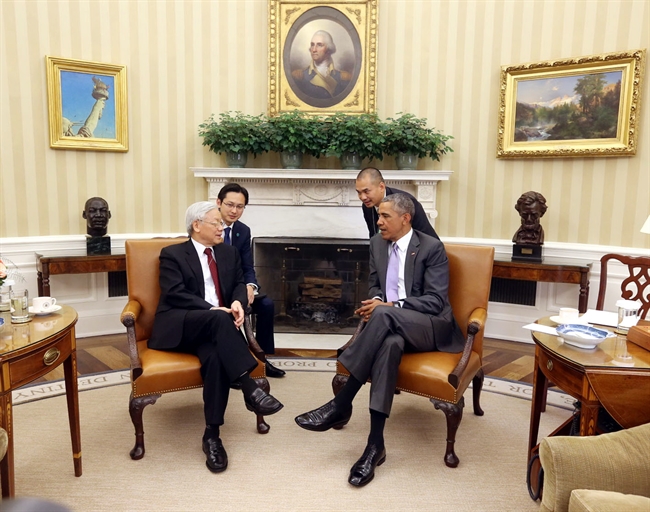 Party General Secretary Nguyen Phu Trong pays an official visit to the US in 2015. Photo: Tri Dung/VNA
Party General Secretary Nguyen Phu Trong pays an official visit to the US in 2015. Photo: Tri Dung/VNA
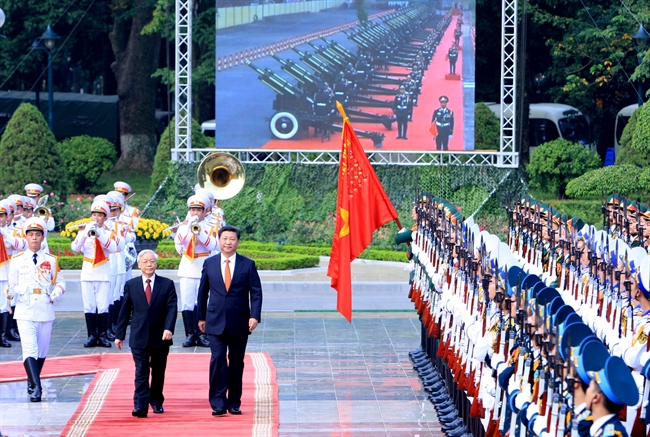 Chinese Party General Secretary/President Xi Jinping pays a State visit to Vietnam in 2015. Photo: Thong Nhat/VNA
Chinese Party General Secretary/President Xi Jinping pays a State visit to Vietnam in 2015. Photo: Thong Nhat/VNA
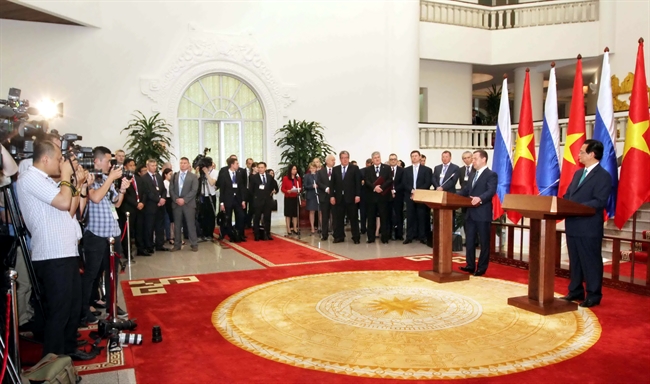 Russian Prime Minister Dmitry Medvedev pays his official visit to Vietnam in 2015. Photo: Duc Tam/VNA
Russian Prime Minister Dmitry Medvedev pays his official visit to Vietnam in 2015. Photo: Duc Tam/VNA
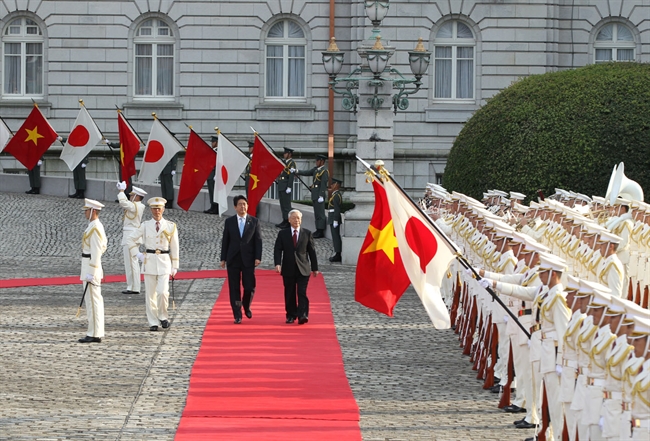 Party General Secretary Nguyen Phu Trong pays an official visit to Japan in 2015. Photo: Tri Dung/VNA
Party General Secretary Nguyen Phu Trong pays an official visit to Japan in 2015. Photo: Tri Dung/VNA
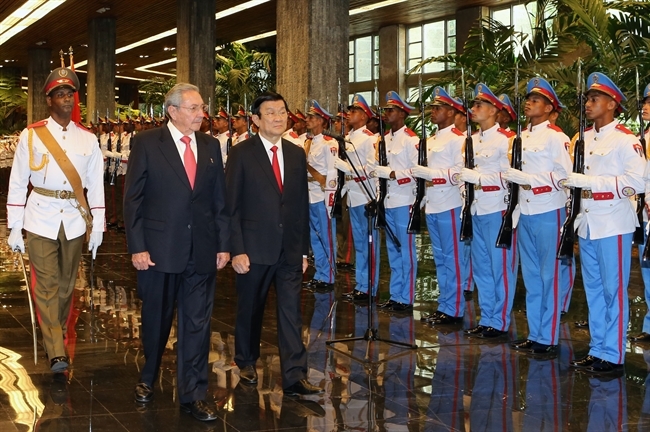 State President Truong Tan Sang pays an official visit to Cuba in 2015. Photo: Nguyen Khang/VNA
State President Truong Tan Sang pays an official visit to Cuba in 2015. Photo: Nguyen Khang/VNA
Although the time that Vietnam has participated in ASEAN is about half of this organization’s history, it has been the vanguard in implementing measures to build the ASEAN Economic Community and become a bridge connecting mainland and island ASEAN economies and promoting cooperation between the group and its partners, thus turning the bloc into a centre of the economic-trade network and connectivity in Asia-the Pacific.
The country has affirmed its role as an active member in Southeast Asia in promoting a dialogue with the aim of preserving a peaceful environment, security and stability in the region, pushing for serious adherence to the Declaration on the Conduct of Parties in the East Sea (DOC) and striving for the early formation of the Code of Conduct in the East Sea (COC) on the basis of international law and common norms. Vietnam has practically and responsibly contributed to consolidating peace, cooperation and development in Asia-Pacific. The maintenance of peace and stability in the Southeast Asian region is to ensure the peaceful environment to serve the target of national development.
In 2014, Vietnam joined the UN peace-keeping mission for the first time. The country also became the first Southeast Asian nation to ratify seven out of nine of the UN’s key conventions on human rights and accelerated the revision of domestic regulations to suit international practices, particularly in protecting the rights of minority and vulnerable groups in society.
Vietnam’s participation in the Trans-Pacific Partnership (TPP) agreement, the Regional Comprehensive Economic Partnership (RCEP) agreement and the Asian Infrastructure Investment Bank (AIIB) from the beginning is considered a sound strategic measure, which has enabled the country to join in deciding the rules of these mechanisms as a founding member, thus maximizing national interest. This is a new approach which will help the country take an active role in multilateral mechanisms which are usually dominated by powerful countries, he said.
Vietnam has also been the vanguard of concluding important free trade agreements (FTAs) with the world’s leading economic and political centres such as the EU, Russia (the Eurasian Economic Union) and the RoK.
With 15 free trade agreements to be signed or take effect by 2020, Vietnam will become involved in a network of regional FTAs with 58 partners, including all five permanent members of the UN Security Council and 15 G20 countries, which will account for 80% of the world GDP.
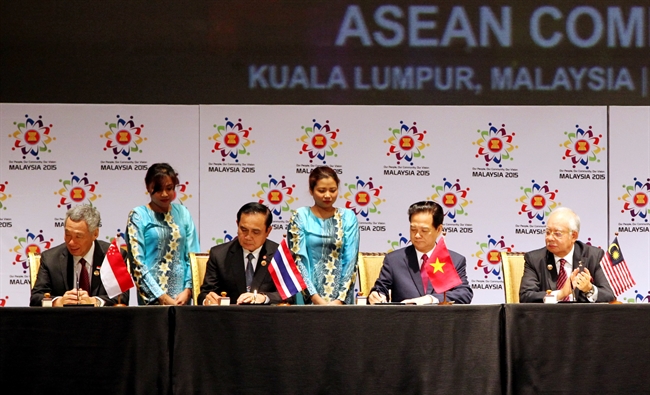 TPrime Minister Nguyen Tan Dung attends the signing of the 2015 Kuala Lumpur Declaration on the formation of
TPrime Minister Nguyen Tan Dung attends the signing of the 2015 Kuala Lumpur Declaration on the formation of
an ASEAN Community. Photo: Duc Tam - VNA
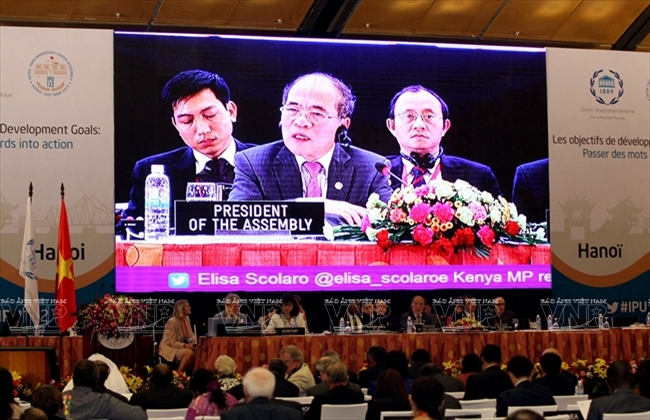 Vietnam successfully held the 132nd Assembly of the Inter-Parliamentary Union (IPU–132). Photo: VNA
Vietnam successfully held the 132nd Assembly of the Inter-Parliamentary Union (IPU–132). Photo: VNA
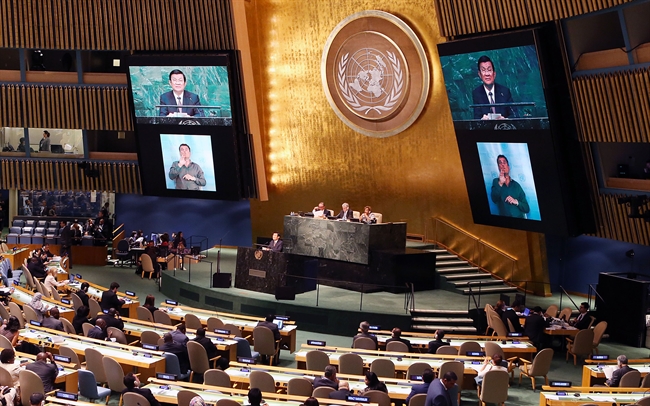 State President Truong Tan Sang attends the UN Summit 2015. Photo: Nguyen Khang - VNA
State President Truong Tan Sang attends the UN Summit 2015. Photo: Nguyen Khang - VNA
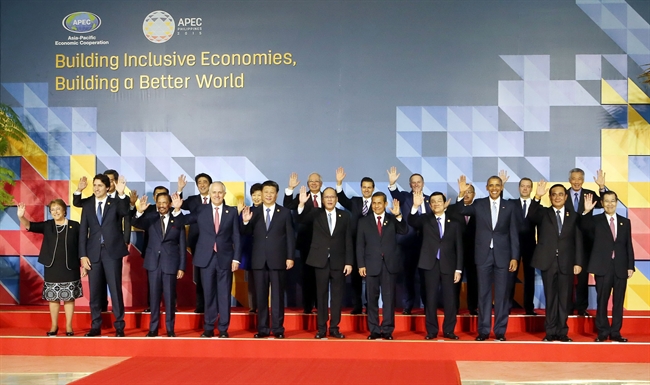 State President Truong Tan Sang attends the23rd Asia Pacific Economic Cooperation (APEC 23) Summit in the Philippines.
State President Truong Tan Sang attends the23rd Asia Pacific Economic Cooperation (APEC 23) Summit in the Philippines.
Photo: Nguyen Khang - VNA
Besides quantitative benefits, the effective use of multilateral diplomacy within ASEAN has raised Vietnam’s strategic value and role in powerful countries’ policy towards the region. Over the past 15 years, Vietnam has established strategic and comprehensive partnerships with all neighbouring countries and those having an important role and position in the world.
Through multilateral cooperation mechanisms with ASEAN at the centre, Vietnam’s interests have become increasingly intertwined with those of major countries with great influence in the region and the world, thus helping maintain a peaceful and stable environment and take advantage of resources in service of the country’s development.
Box:
- Strategic partners: China, Russia, India, Japan, RoK, the UK, France, Italy, Spain, Thailand, Indonesia, Singapore, Malaysia, the Philippines.
- Comprehensive partners: the US, Australia, New Zealand, Denmark, Ukraine, South Africa, Brazil, Chile, Argentina and Venezuela.
---
* The title is named by VNP
By VNA/VNP